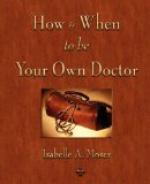At the start of my nurses training I was intensely curious about everything in the hospital: birth, death, surgery, illness, etc. I found most births to be joyful, at least when everything came out all right. Most people died very alone in the hospital, terrified if they were conscious, and all seemed totally unprepared for death, emotionally or spiritually. None of the hospital staff wanted to be with a dying person except me; most hospital staff were unable to confront death any more bravely than those who were dying. So I made it a point of being at the death bed. The doctors and nurses found it extremely unpleasant to have to deal with the preparation of the dead body for the morgue; this chore usually fell to me also. I did not mind dead bodies. They certainly did not mind me!
I had the most difficulty accepting surgery. There were times when surgery was clearly a life saving intervention, particularly when the person had incurred a traumatic injury, but there were many other cases when, though the knife was the treatment of choice, the results were disastrous.
Whenever I think of surgery, my recollections always go to a man with cancer of the larynx. At that time the University of Alberta had the most respected surgeons and cancer specialists in the country. To treat cancer they invariably did surgery, plus radiation and chemotherapy to eradicate all traces of cancerous tissue in the body, but they seemed to forget there also was a human being residing in that very same cancerous body. This particularly unfortunate man came into our hospital as a whole human being, though sick with cancer. He could still speak, eat, swallow, and looked normal. But after surgery he had no larynx, nor esophagus, nor tongue, and no lower jaw.
The head surgeon, who, by the way, was considered to be a virtual god amongst gods, came back from the operating room smiling from ear to ear, announcing proudly that he had ‘got all the cancer’. But when I saw the result I thought he’d done a butcher’s job. The victim couldn’t speak at all, nor eat except through a tube, and he looked grotesque. Worst, he had lost all will to live. I thought the man would have been much better off to keep his body parts as long as he could, and die a whole person able to speak, eating if he felt like it, being with friends and family without inspiring a gasp of horror.
I was sure there must be better ways of dealing with degenerative conditions such as cancer, but I had no idea what they might be or how to find out. There was no literature on medical alternatives in the university library, and no one in the medical school ever hinted at the possibility except when the doctors took jabs at chiropractors. Since no one else viewed the situation as I did I started to think I might be in the wrong profession.
It also bothered me that patients were not respected, were not people; they were considered a “case” or a “condition.” I was frequently reprimanded for wasting time talking to patients, trying to get acquainted. The only place in the hospital where human contact was acceptable was the psychiatric ward. So I enjoyed the rotation to psychiatry for that reason, and decided that I would like to make psychiatry or psychology my specialty.




